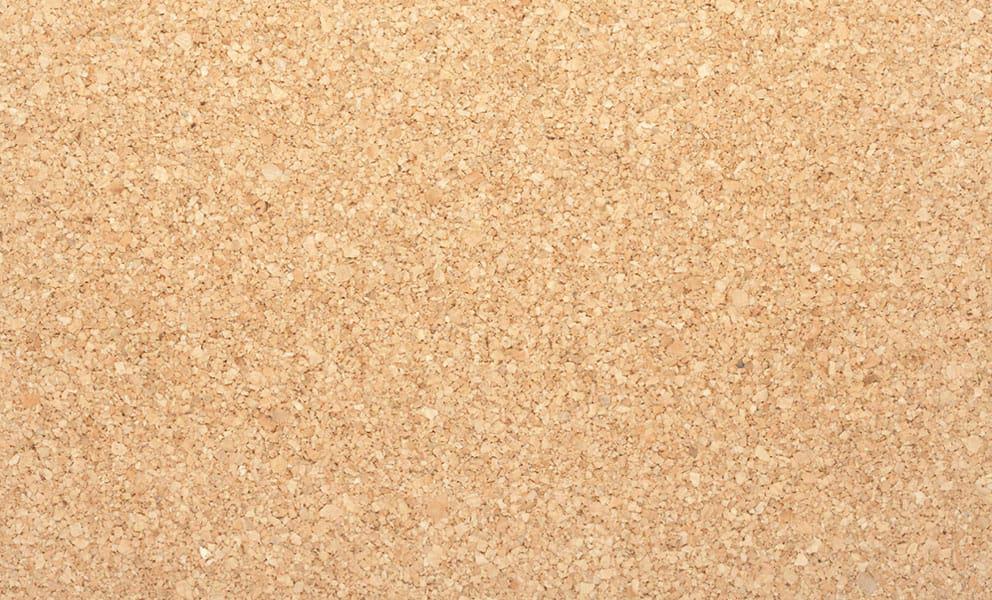
But if you’re feeling concerned about its environmental impact, you might be wondering, “is cork sustainable and eco-friendly?”. To put your mind at ease, let’s answer those questions now…
Put simply, yes! For one thing, as cork is taken from bark, there’s no need for any tree felling.
What’s more, the production process of cork is sustainable as well. Once the harvested cork slabs have been cleaned and softened, wine bottle corks can be punched out. When this is complete, any left-over natural cork can be ground down into granules.
These are then glued back together to make agglomerate cork. This is the type of cork used to make technical corks, cork noticeboards and – you guessed it – sprayed cork insulation. Many chemical by-products of this production process, such as tannins, can also be reused.
Even better, cork is sustainable in terms of waste and recyclability. After it has served its purpose, cork can be recycled by grinding it down into granules as above. This is the case for cork stoppers, with the granules then used for some of the many other cork applications.
At present, only 2-3% of cork stoppers are recycled. This is primarily due to a lack of awareness that cork is recyclable. There is a UK scheme called Recorked, which allows you to post your used corks or drop them off at local collection points.
But is cork sustainable if people don’t recycle the material? The answer is still yes. Even if cork goes to landfill, the material will naturally biodegrade within a decade. When doing so, it doesn’t release any harmful toxins, so using cork doesn’t mean you’re contributing to unsustainable landfill use or emissions.
To put cork’s sustainability credentials into context, let’s compare it to some other materials. Firstly, as a wine stopper, screw caps are the usual alternative. While advocates stress they are recyclable, they are often not recycled, like cork. Unlike cork, they aren’t biodegradable, posing landfill issues.
In terms of insulation, one of the most common alternatives are boards made from materials like polyurethane. These materials aren’t sustainable because they are a plastic, relying on a finite resource – oil – for production. Additionally, they don’t break down as waste – taking at least 500 years to fully decompose. That’s why every piece of plastic ever made still exists.
So, is cork eco-friendly as well? Felling oak trees can have a negative impact on the environment, as it prevents them from absorbing CO2. However, cork is harvested from the bark of a tree, and therefore doesn’t require the tree to be felled at all.
In fact, as the tree regrows its bark, it actually absorbs around 3-5 times more CO2 than non-harvested trees. And this isn’t just a one-off occurrence – once a cork oak tree reaches 25, it can be felled every 9-14 years! This doesn’t hurt the tree – it can actually help it to last longer.
Cork oak woodlands, also known as Montados in Portugal, span over 2 million hectares of land across the countries around the Mediterranean Sea, including Portugal, Spain and Algeria. Montados are sites of great biodiversity – including many endangered species. Protecting these forests also means protecting the birds and plant life that call this habitat their home.
And it doesn’t stop there – cork’s fire-resistant properties shield the forest from fires, and harvesting provides many jobs for the local workforce.
Again, it’s worth comparing that to other materials to see just how eco-friendly cork is. Other species of tree are a case in point. While timber is regenerative (making it potentially sustainable), it relies on eco-friendly practices to prevent deforestation. All too often, they’re ignored – which is why the world has lost around a billion acres of forest since 1990.
Fewer trees means less CO2 being absorbed, so it’s no wonder that atmospheric CO2 continues to rise steadily.
As for other types of insulation, you’ll find that they claim to be eco-friendly simply because they improve thermal efficiency. That’s why it’s always worth digging a little deeper to see how materials are sourced, manufactured and disposed of.
If you’re wondering “is cork sustainable?”, you might be interested to know that it’s also a sustainable option for your home. As energy bills rise, many homeowners are turning to the benefits of insulation – but these can often be costly and made from harmful, mass-produced materials.
Meanwhile, cork alternatives, like CorkSol’s SprayCork, utilise cork’s natural thermal insulating abilities to keep properties warm and cosy through winter – and cool in summer. It’s been proven to reduce heat loss by 30%!
One of the best things you can do for the environment as an individual is use less energy. Cork can help you do that by keeping the heat generated by your radiators (or other heat source) inside your four walls.
So, is cork sustainable and eco-friendly? The result is clear – it absolutely is! From its CO2 absorption to thermal insulation properties, there are lots of benefits to cork.
If you’re looking for an eco-friendly insulation that also provides great results, look no further than SprayCork from CorkSol. This moisture-resistant cork coating provides robust thermal and acoustic insulation as both an internal coating and exterior render.
Made from cork granules, it offers an array of natural qualities including flexibility, breathability, strong adhesion, durability and even fire resistance. Best of all, you can rest assured application will be top-notch as SprayCork is available exclusively to our fully trained network of approved applicators.
If you’d like to learn more, why not have a read of our comprehensive guide to cork insulation. Alternatively, give our friendly team a call on 01484 442420 or find your nearest approved applicator online.
"*" indicates required fields